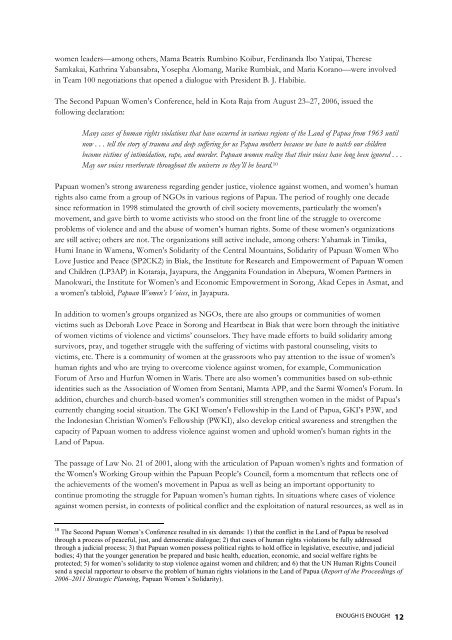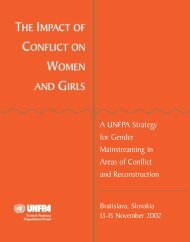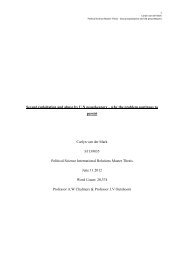Stop Sudah English-revised-March2012 - International Center for ...
Stop Sudah English-revised-March2012 - International Center for ...
Stop Sudah English-revised-March2012 - International Center for ...
Create successful ePaper yourself
Turn your PDF publications into a flip-book with our unique Google optimized e-Paper software.
women leaders—among others, Mama Beatrix Rumbino Koibur, Ferdinanda Ibo Yatipai, Therese<br />
Samkakai, Kathrina Yabansabra, Yosepha Alomang, Marike Rumbiak, and Maria Korano—were involved<br />
in Team 100 negotiations that opened a dialogue with President B. J. Habibie.<br />
The Second Papuan Women’s Conference, held in Kota Raja from August 23–27, 2006, issued the<br />
following declaration:<br />
Many cases of human rights violations that have occurred in various regions of the Land of Papua from 1963 until<br />
now . . . tell the story of trauma and deep suffering <strong>for</strong> us Papua mothers because we have to watch our children<br />
become victims of intimidation, rape, and murder. Papuan women realize that their voices have long been ignored . . .<br />
May our voices reverberate throughout the universe so they’ll be heard. 10<br />
Papuan women’s strong awareness regarding gender justice, violence against women, and women’s human<br />
rights also came from a group of NGOs in various regions of Papua. The period of roughly one decade<br />
since re<strong>for</strong>mation in 1998 stimulated the growth of civil society movements, particularly the women's<br />
movement, and gave birth to wome activists who stood on the front line of the struggle to overcome<br />
problems of violence and and the abuse of women’s human rights. Some of these women’s organizations<br />
are still active; others are not. The organizations still active include, among others: Yahamak in Timika,<br />
Humi Inane in Wamena, Women’s Solidarity of the Central Mountains, Solidarity of Papuan Women Who<br />
Love Justice and Peace (SP2CK2) in Biak, the Institute <strong>for</strong> Research and Empowerment of Papuan Women<br />
and Children (LP3AP) in Kotaraja, Jayapura, the Angganita Foundation in Abepura, Women Partners in<br />
Manokwari, the Institute <strong>for</strong> Women’s and Economic Empowerment in Sorong, Akad Cepes in Asmat, and<br />
a women's tabloid, Papuan Women’s Voices, in Jayapura.<br />
In addition to women’s groups organized as NGOs, there are also groups or communities of women<br />
victims such as Deborah Love Peace in Sorong and Heartbeat in Biak that were born through the initiative<br />
of women victims of violence and victims’ counselors. They have made ef<strong>for</strong>ts to build solidarity among<br />
survivors, pray, and together struggle with the suffering of victims with pastoral counseling, visits to<br />
victims, etc. There is a community of women at the grassroots who pay attention to the issue of women’s<br />
human rights and who are trying to overcome violence against women, <strong>for</strong> example, Communication<br />
Forum of Arso and Hurfun Women in Waris. There are also women’s communities based on sub-ethnic<br />
identities such as the Association of Women from Sentani, Mamta APP, and the Sarmi Women's Forum. In<br />
addition, churches and church-based women’s communities still strengthen women in the midst of Papua’s<br />
currently changing social situation. The GKI Women's Fellowship in the Land of Papua, GKI’s P3W, and<br />
the Indonesian Christian Women's Fellowship (PWKI), also develop critical awareness and strengthen the<br />
capacity of Papuan women to address violence against women and uphold women's human rights in the<br />
Land of Papua.<br />
The passage of Law No. 21 of 2001, along with the articulation of Papuan women’s rights and <strong>for</strong>mation of<br />
the Women's Working Group within the Papuan People’s Council, <strong>for</strong>m a momentum that reflects one of<br />
the achievements of the women's movement in Papua as well as being an important opportunity to<br />
continue promoting the struggle <strong>for</strong> Papuan women’s human rights. In situations where cases of violence<br />
against women persist, in contexts of political conflict and the exploitation of natural resources, as well as in<br />
10 The Second Papuan Women’s Conference resulted in six demands: 1) that the conflict in the Land of Papua be resolved<br />
through a process of peaceful, just, and democratic dialogue; 2) that cases of human rights violations be fully addressed<br />
through a judicial process; 3) that Papuan women possess political rights to hold office in legislative, executive, and judicial<br />
bodies; 4) that the younger generation be prepared and basic health, education, economic, and social welfare rights be<br />
protected; 5) <strong>for</strong> women’s solidarity to stop violence against women and children; and 6) that the UN Human Rights Council<br />
send a special rapporteur to observe the problem of human rights violations in the Land of Papua (Report of the Proceedings of<br />
2006–2011 Strategic Planning, Papuan Women’s Solidarity).<br />
ENOUGH IS ENOUGH! 12




![IANSA [PDF, 2MB] - PeaceWomen](https://img.yumpu.com/25206379/1/190x123/iansa-pdf-2mb-peacewomen.jpg?quality=85)
![Commitments Sample [PDF, 93KB] - PeaceWomen](https://img.yumpu.com/25206331/1/190x245/commitments-sample-pdf-93kb-peacewomen.jpg?quality=85)










![A Toolkit for Advocacy and Action [PDF, 260KB] - Peace Women](https://img.yumpu.com/25205989/1/190x245/a-toolkit-for-advocacy-and-action-pdf-260kb-peace-women.jpg?quality=85)